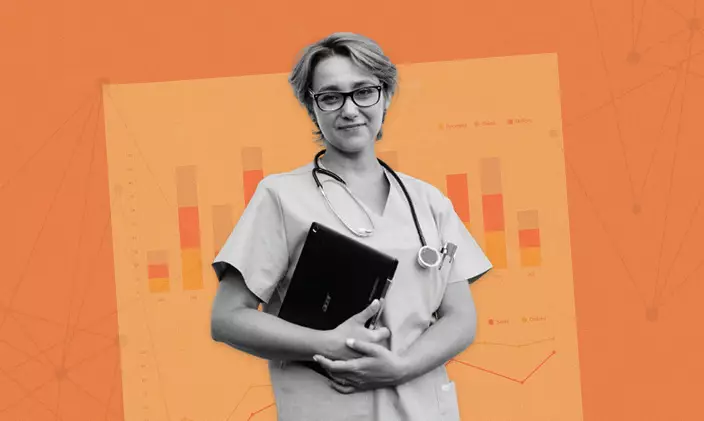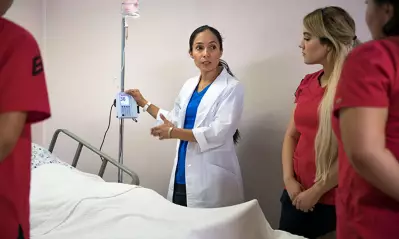What is nursing informatics?
This article was updated on January 30, 2024.

Written by Michael Feder

This article was reviewed by Raelene Brooks, Dean, College of Nursing.

Healthcare organizations regularly gather patient data, but what do they do with it? Healthcare professionals understand that nursing informatics affects every stage of the data usage process. People who collect patient data, isolate trends in the data and analyze those trends inform more efficient processes that impact patients’ quality of care.
What is nursing informatics?
The nursing informatics specialty integrates nursing science, computer science and information science. Nurses who develop these skills use them to manage and communicate data, information, knowledge and wisdom in nursing practice .It leverages science and data analytics to collect, sort and analyze patient information. No matter the format patient data takes — electronic medical records, diagnostic tests, even vital signs —informatics helps other medical professionals draw conclusions from data trends that can inform better patient care.
Informatics professionals often take leadership roles. They may be responsible for staff education on new technologies that include:
- Managing projects
- Improving clinical workflow efficiencies
- Improving patient care
- Assessing department and organizational policies
- Assessing and analyzing healthcare informatics current practice
- Implementing policy surrounding informatics usage
- Leading a culture of safety through the use of informatics and communication
What is the role of informatics in healthcare?
Effective nursing informatics can benefit patients, medical professionals and healthcare businesses. As the medical landscape has evolved, it has become increasingly essential. Hospitals and clinics use informatics to support their patients, nurses and other healthcare providers in decision-making. It plays a critical role in the healthcare system in the following ways:
- Enhances patient care. By organizing data easily, healthcare professionals can more easily draw conclusions that inform better patient care and improve their patients’ quality of life.
- Aids data management. Healthcare facilities manage large amounts of health information, and nursing informatics helps ensure it’s accurate, relevant and confidential. Informatics also ensures healthcare providers can access patient information.
- Supports decision-making. Healthcare professionals use health information technology to support decision-making in patient care and to address healthcare disparities. That includes using electronic health records (EHRs), computerized physician order entry systems and other clinical decision support systems.
- Improves efficiency. Automating routine tasks can help healthcare systems be more efficient. This can lead to cost savings and improved patient outcomes.
- Helps with research and policy development. They play a crucial role in research through data collection and analysis. Hospitals and providers can use this data to improve patient care, contribute to scientific literature and inform policy development.
What is the value of informatics to patients, healthcare providers and systems?
Nursing informatics can improve patient care by enhancing the efficiency and accuracy of documentation. Accurate records enable better decision-making and reduce the risk of medical errors. That can lead to more-personalized care plans, especially when data highlights patterns and trends for individual patients.
It’s not just patients and individual providers who benefit from informatics. Healthcare systems are increasingly reliant on digital technology. Nursing informatics is the key to managing those complex systems. Organizations that embrace informatics can streamline workflows and improve communication, especially when handling sensitive patient data.
By analyzing large data sets, it can help stakeholders identify public health trends and inform policy decisions. Consider the role of informatics during the COVID-19 pandemic. It played a role in tracking the virus’s spread. It also informed public health decisions and how to manage resources.
Informatics and statistics can also play a role in life-span forecasting. Physicians, insurance companies, governments and, of course, patients all have a vested interest in improving life expectancy. Nursing informatics can give greater insight into how to decrease population mortality. As more providers collect and share data, it allows for better predictions about patient outcomes.
Current nurses can benefit from expertise in informatics via new career opportunities, whether that’s becoming a nursing director or clinical manager. These roles don’t just influence patient care on a larger scale. They also play a significant part in shaping healthcare’s future in the following ways:
- Personalized medicine: With more data, providers can tailor treatments to individual patients based on their genetic makeup, lifestyle and environment. That personalized approach could increase treatment efficacy and minimize side effects.
- Predictive analytics: Advanced algorithms can analyze vast amounts of data and identify patterns. This could allow for earlier interventions and better patient outcomes.
- Telemedicine: As wearable technology and remote monitor devices become more sophisticated, providers can track real-time patient health and intervene when necessary.
- Improved public health: Large-scale data reveals trends in disease prevalence and helps with public health strategy to control epidemics and pandemics.
- Clinical trials: More data improves the design and execution of clinical trials. This makes them more efficient and accurate.
- Better patient engagement: When patients have more access to their own health data, they can take a more active role in managing their health. This can lead to improved outcomes.
Educational requirements
Typically, a Bachelor of Science in Nursing (BSN) is required to work in nursing informatics. This requires interested candidates to first be a registered nurse. Becoming an RN requires graduating from an approved diploma nursing program, earning an Associate Degree in Nursing (ADN) or Associate of Science in Nursing (ASN), or earning a BSN, and obtaining licensure as a registered nurse in at least one state. If an RN has not already earned their BSN, they may choose to enter an RN to BSN program to earn their bachelor’s degree.
If you’re eager to go beyond data collection and basic skills in this field, you may wish to consider a Master of Science in Nursing with a concentration in Informatics. First, registered nurses must obtain their bachelor’s degree. The master’s degree teaches advanced nursing theory and research to provide the foundation for nurse leaders to help influence the future of nursing and healthcare.
Nursing informaticist jobs
Nursing informaticists maintain a variety of responsibilities. The exact duties of these professionals often vary. Common day-to-day duties include the following tasks:
- Collect and store patient data in a Health Insurance Portability and Accountability Act (HIPAA)-compliant digital location until it is ready for use.
- Manage communication and information technology development and implementation.
- Drive technology implementation by researching options for improved nursing informatics processes.
- Educate and encourage other healthcare professionals who might benefit from nursing informatics in clinical practice.
- Manage informatics software to collect and store patient data or to identify trends across data sets.
- Determine department or organization technological needs as well as improving existing ones.
- Research latest methods for improving patient care.
Those are just several responsibilities that a informaticist may have. There may be more.
Helpful skills for a job in nursing informatics
Professionals in nursing informatics rely on a variety of skills in a clinical environment. These can include the following skills:
- Research: Research findings inform the development and implementation of innovative informatics solutions with the goal of enhancing patient care, streamlining processes and improving overall healthcare outcomes.
- Information and project management: Nursing informatics involves managing information effectively. Providers must organize, store and retrieve their data to optimize patient care. Nurses who pursue an informatics career also benefit from strong project management skills.
- Communication: Informatics professionals must explain complex technical concepts to non-technical team members. They also need to collaborate with other professionals and advocate for patients’ needs. Good communication ensures health information systems work for patients and providers.
- Basic computer use and computer programming: A foundational understanding of computer use, including software applications and using the internet, is essential. Some roles in informatics may even require programming knowledge to customize and improve data systems.
- Technology research and data analysis: Staying up to date on the latest health technology trends and research is essential. If the job involves interpreting patient data, analysis skills can help identify trends and make informed decisions.
- Critical thinking and problem-solving: Nursing informaticists must be able to think critically about important issues. Troubleshooting technical issues is a significant part of the job.
- Knowledge of health data systems: Understanding how health data systems work is fundamental to this role. Understanding how electronic health records interact with telemedicine platforms supports patient care and improves healthcare outcomes.
Career paths
Some of the positions along this career trajectory include the following paths.
Clinical director
Top-tier executives oversee the daily operations and long-term strategic planning for healthcare facilities or multiple departments. They usually manage staff, budgets and administrative tasks. They’re also liaisons between medical staff and upper management. Two potential degrees from University of Phoenix that can help in pursuit of this goal are the Master of Science in Nursing with a concentration in Informatics and the Master of Science in Nursing with a concentration in Nurse Administration.
Clinical manager
Clinical managers often have similar responsibilities to clinical directors, including administrating staff and payroll. Unlike directors, however, a clinical manager usually oversees a single department at an operational — not strategic — level. Most clinical managers have a master’s degree in fields like business administration, healthcare management, public health administration or healthcare administration.
Nursing director
Nursing directors are high-level professionals who oversee nursing activities in a healthcare facility. Nursing directors manage, direct and coordinate the nursing team to ensure efficient, effective patient care. Some employers prefer a Bachelor of Science in Nursing for this role. In some cases, employers prefer a Master of Science in Nursing with a concentration in Nurse Administration.
Nursing informatics education
Nursing informatics describes a subset of health informatics. University of Phoenix offers a Master of Science in Nursing with a concentration in Informatics. In this program, students learn information systems, research, advocacy, advanced nursing practice, operations and continuous quality improvement. Career outcomes with this degree include becoming a clinical director or manager, or a nursing director.
If you’re ready to start, apply to the program or request additional information.

ABOUT THE AUTHOR
A graduate of Johns Hopkins University and its Writing Seminars program and winner of the Stephen A. Dixon Literary Prize, Michael Feder brings an eye for detail and a passion for research to every article he writes. His academic and professional background includes experience in marketing, content development, script writing and SEO. Today, he works as a multimedia specialist at University of Phoenix where he covers a variety of topics ranging from healthcare to IT.

ABOUT THE REVIEWER
Dr. Raelene Brooks, dean of the College of Nursing, has been a registered nurse for more than 25 years and practiced extensively in the areas of ICU, trauma and critical care. Her publications include a focus on nursing education, critical care, and organizational wellness and engagement. She is a leader in creating, guiding and launching innovative curriculum.
This article has been vetted by University of Phoenix's editorial advisory committee.
Read more about our editorial process.


